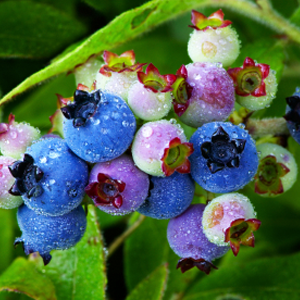Blueberry is used for preventing cataracts and glaucoma and for treating ulcers, urinary tract infections (UTIs), multiple sclerosis (MS), chronic fatigue syndrome (CFS), colic, fever, varicose veins, and hemorrhoids. Blueberry is also used for improving circulation, and as a laxative. Native Americans used the potent fruit to treat coughs.
Blueberry ranks the highest of any fruit for antioxidants (those free-radical-fighting powerhouses). They owe their distinct deep blues and reds to their high anthocyanin content. Berry anthocyanins have demonstrated a broad spectrum of biomedical functions including cardiovascular disorders, advancing age-induced oxidative stress, inflammatory responses, and diverse degenerative diseases. They may also improve neuronal and cognitive brain functions, ocular health, and protect genomic DNA integrity.
Flavonoids exert numerous neuroprotective actions within the brain, including a potential to protect neurons against injury induced by neurotoxins, an ability to suppress neuro-inflammation, and the potential to promote memory, learning and cognitive function(2). Phytonutrients may possess mechanisms of potential disease-preventive action, including antioxidant, antibacterial, antiviral, and antiangiogenic properties, enhanced production of detoxification enzymes, enhancing immune health, reduction of platelet aggregation, promotion of a healthy lipid profile, reducing hypertension, and impacting hormone metabolism. Blueberry might help prevent bladder infections by stopping bacteria from attaching to the walls of the bladder(1). Blueberry fruit is high in fiber, which could help normal digestive function. It also contains vitamin C and other antioxidants.
Oxidative stress, microglial activation, and proinflammatory factors are known to decrease cell proliferation and limit neuroplasticity. Polyphenols from blueberry and green tea are high in antioxidant and anti-inflammatory activity that decreases the damaging effects of reactive oxygen species (ROS), in the blood, brain, and other tissues of the body(6). Numerous patents have been filed that include blueberries, green tea extracts, and vitamin D3 to increase the proliferation of stem cells(3), (4). One study using a similar compound indicated increased progenitor cells in aged rats(5).
Blueberry might lower blood sugar levels in people with diabetes. Watch for signs of low blood sugar (hypoglycemia) and monitor your blood sugar carefully if you have diabetes and use blueberry products. The dose of your diabetes medications may need to be adjusted by your healthcare provider.
Stem Cells:
3)Davis Sanberg, Cyndy; Sanberg, Paul; Bickford, Paula; Shytle, R. Douglas; and Tan, Jun, "Combined effects of nutrients on proliferation of stem cells" (2008). USF Patents. Paper 612. http://scholarcommons.usf.edu/usf_patents/612
4)Kiss Z, inventor; Zoltan Laboratories Llc, assignee. Combinations of proteins to enhance viability of stem cells and their progenitors before transplantation. United States patent US 8,778,674. 2014 Jul 15. https://www.google.com/patents/US8778674
5)Bickford PC, Kaneko Y, Grimmig B, Pappas C, Small B, Sanberg CD, Sanberg PR, Tan J, Shytle RD. Nutraceutical intervention reverses the negative effects of blood from aged rats on stem cells. AGE. 2015 Oct 1;37(5):1-7. https://www.researchgate.net/profile/Yuji_Kaneko/publication/282248211_Nutraceutical_intervention_reverses_the_negative_effects_of_blood_from_aged_rats_on_stem_cells/links/560abc0108ae840a08d66954.pdf
6)Acosta S, Jernberg J, Sanberg CD, Sanberg PR, Small BJ, et al. (2010) NT-020, a natural therapeutic approach to optimize spatial memory performance and increase neural progenitor cell proliferation and decrease inflammation in the aged rat. Rejuvenation research 13: 581–588. https://www.ncbi.nlm.nih.gov/pubmed/20586644
Diabetes:
Grace, M. H., Ribnicky, D. M., Kuhn, P., Poulev, A., Logendra, S., Yousef, G. G., … Lila, M. A. (2009). Hypoglycemic activity of a novel Anthocyanin-rich formulation from Lowbush Blueberry, Vaccinium angustifolium Aiton. Phytomedicine : International Journal of Phytotherapy and Phytopharmacology, 16(5), 406–415. http://doi.org/10.1016/j.phymed.2009.02.018 https://www.ncbi.nlm.nih.gov/pmc/articles/PMC2718544/
Neural and Disease Prevention:
1)Zafra-Stone, S., Yasmin, T., Bagchi, M., Chatterjee, A., Vinson, J. A. and Bagchi, D. (2007), Berry anthocyanins as novel antioxidants in human health and disease prevention. Mol. Nutr. Food Res., 51: 675–683. doi:10.1002/mnfr.200700002 http://onlinelibrary.wiley.com/doi/10.1002/mnfr.200700002/abstract
2)Vauzour, D., Vafeiadou, K., Rodriguez-Mateos, A., Rendeiro, C., Spencer, J. P. E. “The neuroprotective potential of flavonoids: a multiplicity of effects", Genes & Nutrition,(2008), 3(3), 115—126. Doi=10.1007/s12263-008-0091-4. http://portal.unidoscontraelparkinson.com/Libreria/Tratamiento-Esp_Eng/The%20neuroprotective%20potential%20of%20flavonoids.207.pdf
Van Praag H. Exercise and the brain: Something to chew on. Trends in neurosciences. 2009;32(5):283-290. doi:10.1016/j.tins.2008.12.007. https://www.ncbi.nlm.nih.gov/pmc/articles/PMC2680508/
Murphy T, Dias GP, Thuret S. Effects of Diet on Brain Plasticity in Animal and Human Studies: Mind the Gap. Neural Plasticity. 2014;2014:563160. doi:10.1155/2014/563160. https://www.ncbi.nlm.nih.gov/pmc/articles/PMC4037119/
Duffy KB, Spangler EL, Devan BD, Guo Z, Bowker JL, Janas AM, Hagepanos A, Minor RK, DeCabo R, Mouton PR, Shukitt-Hale B, Joseph JA, Ingram DK. A blueberry-enriched diet provides cellular protection against oxidative stress and reduces a kainate-induced learning impairment in rats. Neurobiol Aging. 2008;29(11):1680-9. doi:10.1016/j.neurobiolaging.2007.04.002 http://www.neurobiologyofaging.org/article/S0197-4580(07)00163-7/fulltext
Prostate Cancer:
Understanding Prostate Cancer – Prevention http://www.webmd.com/prostate-cancer/guide/understanding-prostate-cancer-prevention
